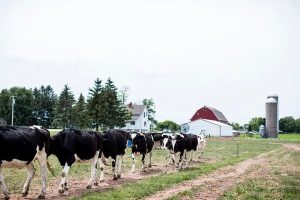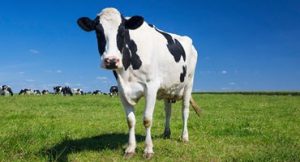
Kosher means appropriate, and following the precepts of this sanctified food is for the Jewish Community a way of dedicating to God the pleasure of eating. This biblical diet has very precise rules as to what is forbidden and what is allowed; and for the elaboration of dairy products and all the products, the presence of the Rabbis is required to certify it, from beginning to end.
As for terrestrial mammals, only split-hoofed ruminants are kosher, such as cows that produce milk, and from which will come the dairy products that will be elaborated later, and whose ingredients must also be Kosher.
Most cow’s milk is suitable for kosher consumption, but for example cheeses, only if they have the seal that certifies it, because the additives that are usually used in their manufacture could be of meat origin, entering into the prohibition of mixing meat and milk, one of the rules of kosher food.
Rabbi Yosef Allami, of the Orthodox Israelite Community C.I.O., works in one of the Rabbinates that, among other services for his community, offers Kosher Certification. While waiting for the plane that would take him to Colombia for a certification, he told eDairyNews that to carry out this task he must have studies and authorizations, under license of some communities.
It is an activity that requires a lot of personnel, because they must witness the whole process of elaboration, which begins in the dairy farm. Everything is supervised, from the moment the milk comes out of the cow to the final packaging of the product.
Tomás Gortari, from San Leonardo in Henderson, Buenos Aires, a Kosher-certified dairy farmer, tells us that a specific day is assigned for production. From the beginning of milking, very early in the morning, with the machinery specially washed and the tanks completely empty, the rabbis witness the process until the milk is loaded onto the truck that takes it to the industry, which is also carefully inspected. This control is ultimately what makes the difference in a regular day’s work at the dairy farm.
Once at the plant, a Rabbi monitors the facilities, which also have a special washing prior to the start of the processes on the day of Kosher production, and the processing of the line product must be suspended in the meantime. We asked about the packaging, and as for the manufacturing processes, except that they are constantly supervised by the Rabbis, they are the same as for conventional line products.
At the Santa Clara Food Factory, in Villa Nueva, Córdoba, Jorge Estevez received us and told us that the interest to certify Kosher was born from specific business proposals. They process around 50 tons of powdered milk, every 1 or 2 years, exclusively for export and the Rabbis who supervise this production come from abroad, depending on the destination.
Rabbi Yosef Allami told us that there are more and more consumers of Kosher dairy products in the world, especially in the USA, where although the Jewish community is small, more than 40% of the products we find in supermarkets have the certification. As verification is very demanding, there is a perception that kosher foods are healthier, and the market is expanding to other consumer niches attracted by the guarantee of hygiene and quality. They are also an alternative for Muslims when halal products are not available.
Both for the local market and for export, which is mostly to Israel, the United States and some to Europe, there are more than 30 plants that produce Kosher dairy products in Argentina, packaging fluid milk, and manufacturing powdered milk, milk caramel, yogurt, cream, butter, cheese and custard; under the brands La nueva Romipal, La Chacra, Lácteos Santa Fé, Verónica, Windy, Festa, Las Tres Niñas, La Rinconada, Servio, Mayol, La Retama and many more.
Shavuot: Jewish Dairy Culture
Jewish culture is closely linked to the consumption of dairy products, and in its rich and varied gastronomic tradition they occupy a prominent place. Shavuot is the day on which the reception of the Torah and the Ten Commandments on Mount Sinai is celebrated. The Milk Supper on Shavuot became a tradition for 6 reasons:
- When the Jewish People received the Torah at Mount Sinai, included in it were instructions for the sacrifice of animals and their preparation. They had not followed these laws before, and everything they had was “non-kosher”. The only alternative was dairy, which did not require advance preparation.
- The Torah is compared to milk, for its ability to nourish the human being, providing him with spiritual nourishment, necessary for his soul.
- The numerical value of the Hebrew word for milk, chalav, is 40. Dairy products are consumed on Shavuot to commemorate the 40 days Moses spent at Mount Sinai receiving instruction on the Torah. He spent 40 more days at Sinai praying, and then another 40 days, until he returned with a new set of stone tablets. In addition, there were 40 generations from Moses receiving the Written Torah, until the generation of Ravina and Rab Ashi, who wrote the final version of the Oral Torah, the Talmud, which begins and ends with the letter mem (gematria, or numerical value 40).
- The commandment corresponding to the day of Shavuot is not to mix meat and milk in preparations.
- Mount Sinai is also called Har Gavnunim. The Hebrew word for cheese is gevina and is etymologically related to Har Gavnunim. Furthermore, the gematria of gevina, cheese, is 70, and corresponds to the 70 faces of the Torah.
- Moses, who at 3 months old was put into the Nile River and rescued by Pharaoh’s daughter, who adopted him and took him to live in the palace, refused to be nursed by the Egyptian nursing mothers. The Talmud explains that his mouth needed to be kept totally pure, as he would one day communicate directly with God. Finally, Pharaoh’s daughter found a woman from whom Moses agreed to be breastfed; she was Yocheved, his biological mother. Dairy foods are eaten on Shavuot to commemorate this phenomenon of Moses’ early childhood.
Dairy products are part of the idiosyncrasy of all cultures, occupying a ritual and cultural role as well as a nutritional one. Also for the Jewish Community, consuming dairy products is good for them.
?שתית את כוס החלב שלך היום
Valeria Guzmán Hamann
EDAIRYNEWS

























